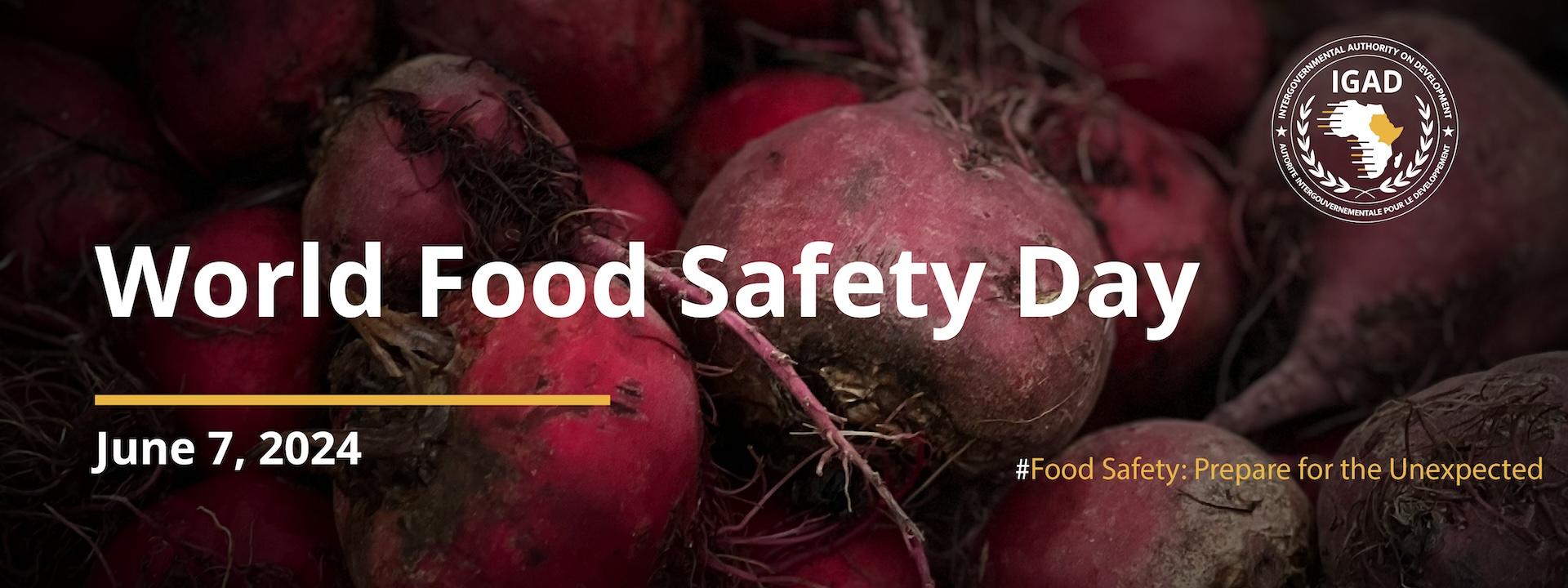The World Food Safety Day, celebrated every year on 7 June, reaches its sixth edition in 2024, gaining relevance worldwide. Its main goal is to draw attention to and inspire actions to help prevent, detect, and manage foodborne risks, contributing to food safety, human health, economic prosperity, agriculture, access to markets, tourism, and sustainable development. Food safety incidents can range from minor events to major international crises, such as a power cut at home, food poisoning in a local restaurant, a voluntary withdrawal of contaminated products by a manufacturer, or an outbreak originating in imported products or a natural disaster.
According to a recent analysis by the Intergovernmental Authority on Development (IGAD) and its partners, an estimated 25 million people in the region are food insecure with the most impacted persons coming from cross-border areas in the region. This implies that these people are living without reliable access to adequate quantities of affordable, nutritious, and safe food. It is on this basis that the FAO Sub-regional Office for Eastern Africa (FAO-SFE) is supporting efforts to improve food safety as an important determinant of intraregional food trade activities and food security dynamics.
Further, FAO-SFE recognises that apart from increasing food security assurance, improving national food safety control and Codex coordinating systems in the region and harmonising them will protect the health of people from foodborne illnesses and promote intra-regional food trade. The need for strengthening national and regional food safety is clearly stated also in the African Continental Free Trade Area (AfCFTA) initiative as one of the ways to boost intra-African trade in agricultural commodities and services and, thereby, improve the situation of food security and nutrition in the region.
It is imperative to assure food safety along the food chain, including all farms and households regardless of whether the food will be consumed by its producer or not. The assurance is provided through the application of measures from farm to household level to control food for the presence of foodborne hazards. A hazard is a biological, chemical, or physical agent in, or condition of, food with the potential to cause an adverse health effect. The measures are integrated into good agricultural practices, good animal husbandry practices, good manufacturing practices, good hygiene practices, and relevant legislation (policies, laws, regulations, and standards).
It is in this context that FAO-SFE, in partnership with IGAD, is providing (among other things) technical support to countries in the sub-region in identifying food safety and control-related gaps at policy, strategy, legal, institutional, and technical levels to better inform subsequent interventions and investments in such areas. A recent assessment of the food safety-related policy, regulatory, and institutional environment of IGAD member countries recommended the development of an IGAD-level regional food safety strategy to: (1) provide a comprehensive and unified framework for member states to improve their respective food safety-related policy, regulatory, and institutional environment, and (2) facilitate the harmonisation of food safety-related standards, practices, and procedures among member states so that food safety-related barriers to regional (and continental) food trade are addressed.
The IGAD Food Safety Strategy was developed and endorsed to address the weaknesses identified by the assessment of the food safety-related policy, regulatory, and institutional environment of IGAD member countries. Given the multi-sectoral nature of food safety measures, the strategy recommended that efforts to improve food safety services in our region should be coordinated across sectors, with the roles and responsibilities of each sector/actor along the food chain prescribed in a food safety policy or strategy. Thus, each country should adopt and implement a food safety policy, strategy, or legislation.
IGAD is committed to ensuring that all people in its member states and the wider region always have physical, social, and economic access to sufficient, safe, and nutritious food to meet their dietary needs and preferences for an active and healthy life. By providing a platform for high-level dialogues, enhancing technical cooperation, building stronger capacities, and fostering partnerships and international collaboration, IGAD will continue to play a key role in implementing the proposed IGAD Food Safety Strategy.
Article by: Mohyeldeen Eltohami Taha Hamed (PhD)
Head of Agriculture & Food Security Unit, IGAD

